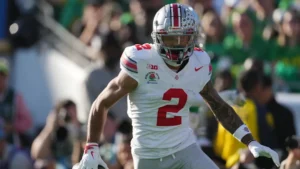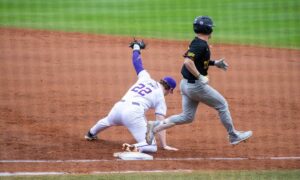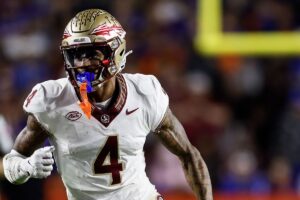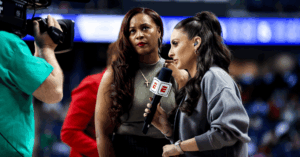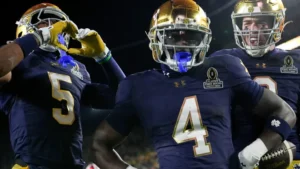
Cheers in the Shadow of the Golden Dome: Notre Dame to Begin Alcohol Sales at Football Games
For more than a century, the experience of attending a Notre Dame football game has remained largely unchanged: a sea of navy and gold pouring into South Bend, the sounds of the band echoing under the golden dome, the smell of grilled sausages drifting through the parking lots, and generations of fans uniting around the storied tradition of Fighting Irish football. But in 2025, one significant shift will bring a modern twist to that game day experience — beer and wine will officially be sold inside Notre Dame Stadium for the first time in program history.
The University of Notre Dame announced this week that alcohol sales will begin at home football games starting this fall, a decision that places the iconic independent program in line with a growing national trend across college football. Once one of the last major holdouts in the debate over booze in the bleachers, the Fighting Irish are joining the wave of institutions seeking to evolve the fan experience and open up a new revenue stream while maintaining a tight grip on their values and traditions.
It’s a landmark moment for a school that’s long been seen as one of the most traditional powerhouses in the sport — a place where faith, discipline, and a sense of community form the foundation of everything from academics to athletics. For many Notre Dame fans, particularly alumni, the idea of selling alcohol within the historic confines of Notre Dame Stadium once seemed unthinkable. Now, after years of internal review and observation of trends across both professional and college sports, the university is taking what it calls a “measured and mindful” step forward.
“We have always been proud of the unique atmosphere of Notre Dame football,” University Vice President John Affleck-Graves said in a statement. “This decision came after careful consideration of how we can enhance the game day experience responsibly while preserving the spirit and values that make Saturdays in South Bend so special.”
The move follows similar policies adopted by universities in the Big Ten, SEC, ACC, and beyond, many of which have seen notable success in implementing alcohol sales at on-campus venues. While Notre Dame is famously independent in football, it has paid close attention to its peers and the positive data surrounding revenue generation, fan satisfaction, and even safety.
According to multiple studies conducted at universities that introduced alcohol sales in recent years, there has been a decrease in alcohol-related incidents, largely attributed to fans drinking more moderately in the stadium versus binge drinking before entering. It’s a trend Notre Dame hopes to replicate through a controlled rollout.
Sales will begin in designated areas of the stadium and include beer and wine options. Liquor will not be sold, and the university has confirmed there will be strict guidelines, including mandatory ID checks, purchase limits, and a halt on sales in the third quarter of each game. Additionally, all concession workers selling alcohol will be required to undergo certified training in responsible beverage service.
The initiative isn’t just about giving fans what they want — though there’s no denying that demand has grown louder in recent years. It’s also a business decision. College athletic departments across the country continue to face financial challenges, from the demands of Name, Image, and Likeness (NIL) compensation structures to rising travel and recruiting costs. Opening up alcohol sales gives Notre Dame access to a revenue stream that could prove significant without major structural or logistical changes.
Notre Dame hasn’t offered official projections yet, but comparable programs have seen seven-figure boosts in their athletic department revenues after introducing alcohol sales. Texas, for example, reported more than $3 million in revenue from stadium alcohol in its first year. If Notre Dame sees anything close to that success, it could mean expanded resources not just for football but for Olympic sports, student-athlete services, and fan experience enhancements.
Of course, as with any shift on hallowed ground, the move is not without criticism. Some alumni and supporters worry that the tradition and reverence of Notre Dame game days might be diluted by what they see as creeping commercialization. There are also concerns from families and older fans who value the relatively calm environment of the current game-day atmosphere.
But others see the decision as a necessary evolution. After all, Notre Dame fans have long gathered before kickoff in the tailgating lots — many with a cold drink in hand. For many, extending that part of the experience inside the stadium simply reflects the reality of modern fandom.
“I grew up coming to games with my dad, and I’ll never forget those moments in the stands with him,” said Brendan O’Malley, a 2009 graduate. “But I also don’t think having a beer with friends during the second quarter is going to ruin that feeling. If anything, it brings us together more.”
Current students and younger fans are, unsurprisingly, among the most enthusiastic about the policy. And while Notre Dame has traditionally enforced strict campus policies on alcohol use, particularly in residence halls, university officials emphasized that stadium sales will be managed by professionals with the primary goal of maintaining safety and community values.
“This is not an open bar,” said athletic director Jack Swarbrick. “This is a tightly regulated operation that gives our fans more choices without compromising the core Notre Dame experience.”
The university also plans to use revenue from the alcohol sales to support campus-wide health and wellness initiatives, including alcohol education programs, mental health resources, and student support services. It’s an approach designed to demonstrate the administration’s ongoing commitment to the well-being of the Notre Dame family, even as it embraces modernization in the name of progress.
The shift comes as Notre Dame continues to navigate a changing college athletics landscape. Conference realignment, NIL, the transfer portal, and playoff expansion have all forced programs to adapt — even one as steeped in tradition as Notre Dame. The decision to sell alcohol may not be as seismic as joining a conference or building a new stadium wing, but it’s symbolically significant.
It marks a moment when the old and the new are being asked to coexist in South Bend. A place where Rockne’s shadow still looms large, where “Play Like a Champion Today” is more than a slogan, and where generations have found meaning in fall Saturdays now finds itself walking a new line — one where tradition meets trend.
There’s also an undeniable fanfare about this being Notre Dame, and not just any program. If Notre Dame is doing it, some would argue, then it’s no longer taboo — it’s acceptable. That carries weight, especially among other Catholic universities or faith-based institutions who might have resisted alcohol sales on moral grounds.
Indeed, university spokesperson Dennis Brown acknowledged that faith and values were central to the discussions leading up to this moment. But he also noted that the Notre Dame mission includes a deep respect for hospitality, community, and celebration — and that those can coexist with responsible alcohol service.
So, what will it look like come September when the Irish run out of the tunnel against a marquee opponent and fans hold up their drinks instead of just their rally towels? For many, it will look like progress. For others, perhaps a bittersweet turn of the page.
But make no mistake: Notre Dame Stadium, that granite cathedral of college football, isn’t losing its soul. It’s adapting. It’s choosing to meet its fans where they are, to welcome the future without letting go of the past.
And as fans raise their glasses high under the glow of Touchdown Jesus this fall, the message will be clear: The times may be changing, but in South Bend, they’re still worth celebrating — responsibly, of course.
